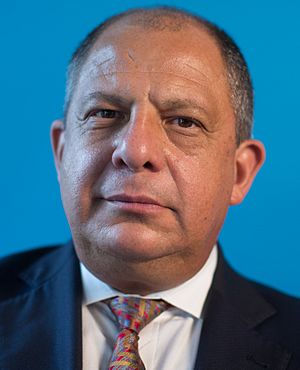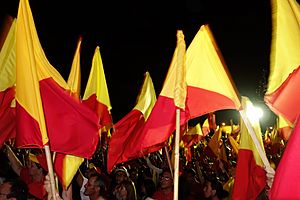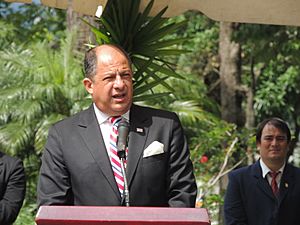Luis Guillermo Solís facts for kids
Quick facts for kids
Luis Guillermo Solís
|
|
|---|---|
 |
|
| 47th President of Costa Rica | |
| In office 8 May 2014 – 8 May 2018 |
|
| Vice President | Helio Fallas Venegas Ana Helena Chacón |
| Preceded by | Laura Chinchilla |
| Succeeded by | Carlos Alvarado |
| President pro tempore of CELAC | |
| In office 8 May 2014 – 28 January 2015 |
|
| Preceded by | Laura Chinchilla |
| Succeeded by | Rafael Correa |
| Personal details | |
| Born |
Luis Guillermo Solís Rivera
25 April 1958 San José, Costa Rica |
| Political party | National Liberation Party (Before 2005) Citizens' Action Party (2009–present) |
| Spouse | Nancy Olive Worsfold Richards (m. 1987 div. 2006) |
| Domestic partner | Mercedes Peñas Domingo (2006–present) |
| Children | 6 |
| Alma mater | University of Costa Rica Tulane University University of Michigan, Ann Arbor |
| Signature |  |
Luis Guillermo Solís Rivera (born 25 April 1958) is a Costa Rican politician and educator. He served as the 47th President of Costa Rica from 2014 to 2018. He is a member of the Citizens' Action Party (PAC).
Solís won the 2014 presidential election by a large margin. He received more votes than any other presidential candidate in Costa Rica's history. He was the first President from the PAC party. Solís had a long career in academics and politics before becoming president. He faced accusations related to business dealings during his presidency. However, these accusations were dismissed by the Public Prosecutor of Costa Rica in May 2018.
Contents
Early Life and Education
Luis Guillermo Solís was born in San José, Costa Rica. His mother, Vivienne Rivera Allen, was an educator. His father, Freddy Solís Avendaño, was a shoemaker. Both his parents were from Turrialba. Because of this, many people from Turrialba consider him one of their own.
Solís grew up in the San José neighborhoods of San Pedro de Montes de Oca and Curridabat. He went to Methodist High School in San José. There, he was the president of the student body. He later studied history at the University of Costa Rica. He earned a degree with honors in 1979. He then earned a master's degree in Latin American Studies from Tulane University in New Orleans.
Academic Career
Solís has held many jobs in universities and as a consultant. From 1981 to 1987, he was a professor at the University of Costa Rica. He was also a Fulbright Scholar at the University of Michigan from 1983 to 1985. During this time, Solís worked with the government of Óscar Arias. He later became the director of the Center for Peace and Reconciliation.
From 1992 to 1995, Solís worked with the Academic Council of the United Nations System. In 1999, he started working for Florida International University. He was a coordinator and researcher there. He studied political and social events in Latin America.
Solís is also a writer. He has published many essays and books about national and international topics. In the 1990s, he wrote for La República, a newspaper in San José. His writings often focused on civil society, international relations, and trade.
Political Journey
Solís joined the National Liberation Party (PLN) in 1977 while still at the University of Costa Rica. He advised Óscar Arias in the Foreign Ministry. He helped with the Esquipulas Peace Agreement. This agreement later helped Arias win a Nobel Peace Prize. Solís also served as the Director of International Relations for the PLN. During José María Figueres Olsen's time as president, Solís was the ambassador for Central American Affairs.
In 2002, Solís became the General Secretary of the PLN. He resigned the next year. He was disappointed with a bribery scandal that involved many PLN leaders. In 2005, he spoke out against the PLN for problems and corruption during party elections. He officially left the party and went back to working in academics.
After the 2006 election, Solís's name came up in discussions within the Citizens' Action Party (PAC). Ottón Solís, one of PAC's founders, suggested Luis Guillermo Solís run as a vice presidential candidate in 2010. However, Luis Guillermo Solís declined because of his work at the General Secretariat of Ibero-America. Employees there were not allowed to participate in elections.
In 2009, Luis Guillermo Solís officially joined PAC. He started attending party meetings in 2010. He traveled around the country to meet with PAC leaders.
2014 Presidential Campaign
Solís announced he would run for president on 27 November 2012. In the PAC's primary election, he competed against three other candidates. He won with 35 percent of the vote. This was only 110 votes more than his closest competitor.
In October 2013, he chose Helio Fallas and Ana Helena Chacón Echeverría as his Vice-Presidential running mates. Solís promised to fight corruption and invest in infrastructure. He also aimed to strengthen Costa Rica's universal health care and social security system. He promised to continue efforts to protect the environment. Solís also said he would slow down new free trade agreements. He received strong support from trade unions in the country.
On 2 February 2014, Solís won the most votes in the first round of the election with 30.95 percent. The PLN candidate came second with 29.95 percent. Most of Solís's support came from the central provinces of San José, Alajuela, Heredia, and Cartago.
Because no candidate received more than 40 percent of the vote, a second round of voting was needed. This runoff election was set for 6 April. However, on 5 March, the other candidate announced he would stop his campaign. Polls showed him far behind Solís. Even so, Costa Rican law required the runoff to still take place. Solís won with over 77 percent of the vote. This was the largest winning margin ever in a free election in Costa Rica. He won a majority in every province. When he took office on 8 May, he was the first president in 66 years not to come from the PLN or the PUSC.
After the election, Solís thanked the voters. He received congratulations from leaders around the world.
Presidency
In April 2014, Solís announced the members of his cabinet. Most of his cabinet members were from the PAC party or were not aligned with any party. Two members from the PUSC party were also included.
Solís became president on 8 May 2014. Delegations from over 80 countries attended his inauguration. These included important figures from Spain, Bolivia, Ecuador, and the Organization of American States. Solís described the country he was taking over as having many challenges. He mentioned growing income inequality, poverty, and a national teachers' strike.
Economic Challenges
In 2014, President Solís proposed a budget with increased spending for the coming years. The 2017 budget totaled US$15.9 billion. A large part of this budget was for debt payments. A significant portion of the budget also needed to be financed, which would increase the country's debt.
In early August 2017, President Solís stated that Costa Rica was facing financial difficulties. He explained that his government was considering higher taxes to help solve the problem. He said these steps were important to pay the country's bills and ensure public services. Solís explained that the government would prioritize payments for public debt first. Then, salaries, pensions, and infrastructure would be paid. Other payments would only be made if funds were available.
Political and Social Beliefs
Like most members of PAC, Solís considers himself a progressivist. His plan, called Plan Rescate (Rescue Plan), showed his political beliefs. This plan focused on three main areas: fighting corruption, promoting economic growth, and reducing income inequality.
Solís believed that past economic policies had created too much income inequality in Costa Rica. He thought that previous governments had not collected enough taxes from large companies and wealthy people. This led to budget problems. Solís aimed to fix this by better enforcing tax collection. He also believed that banks should not only focus on exports. They should also help increase income for poorer people. He felt that economic changes had sometimes harmed women more than men. This was because women often had less access to higher-paying jobs. He also believed that the agricultural industry's financial needs had been overlooked.
Solís supports protecting the environment. He believes Costa Rica had not focused enough on this. He thinks that water resources must be protected from private development and poor management. This had caused water shortages in many areas. Solís stated he would take action against those who violated water management laws.
Solís is a Catholic. He supports the separation of church and state. This is despite Catholicism being the country's official religion. He also supports civil unions.
Personal Life
Luis Guillermo Solís has five children from his first marriage to Nancy Olive Worsfold Richards: Monica, Cristina, Beatriz, Diego, and Ignacio.
Solís is not married to Mercedes Peñas Domingo. However, during his time as president, she was considered the First Lady of Costa Rica. He and Peñas started dating in 2006. They have one daughter, Inés. Peñas said she wanted to be an active adviser to Solís. She also performed duties like greeting important guests. Besides public service and academics, Solís enjoys farming.
As of July 2020, Solís became the Interim Director of the Kimberly Green Latin American and Caribbean Center at Florida International University. He has been working as a professor there since 2018.
See also
 In Spanish: Luis Guillermo Solís para niños
In Spanish: Luis Guillermo Solís para niños
 | Sharif Bey |
 | Hale Woodruff |
 | Richmond Barthé |
 | Purvis Young |



